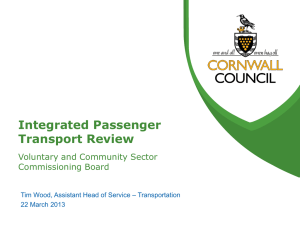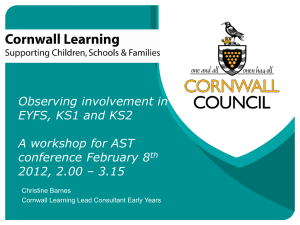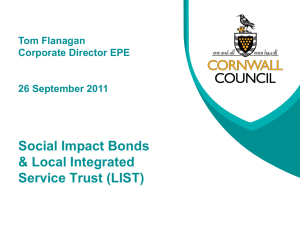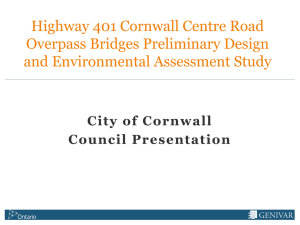Model Child Protection Policy For Children In
advertisement
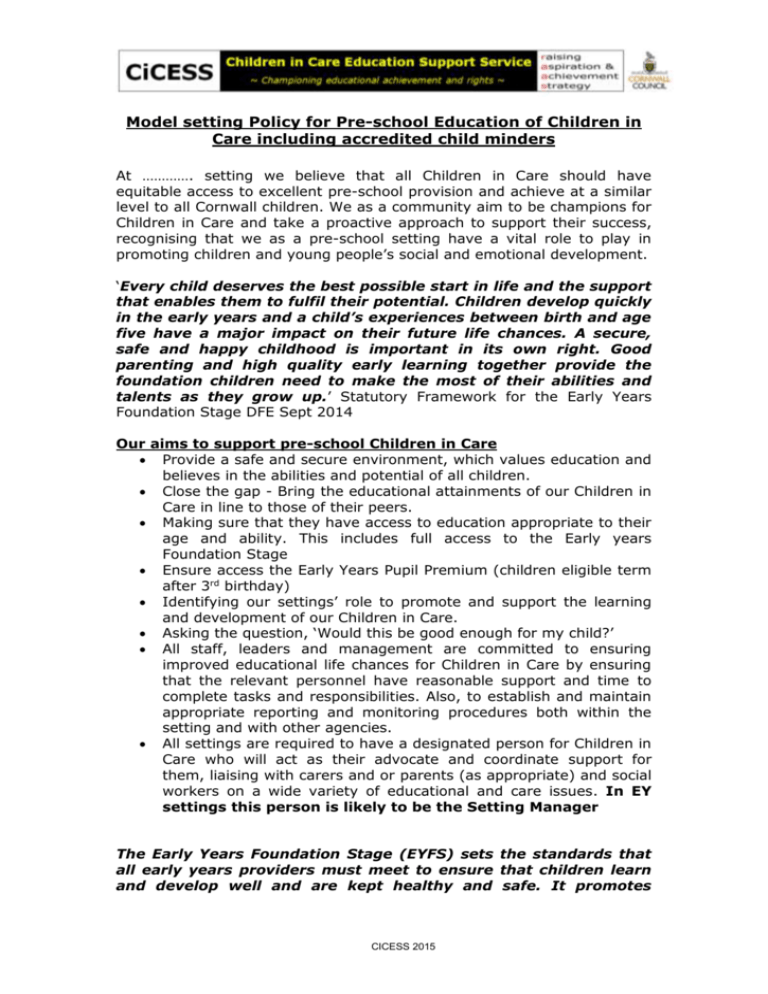
Model setting Policy for Pre-school Education of Children in Care including accredited child minders At …………. setting we believe that all Children in Care should have equitable access to excellent pre-school provision and achieve at a similar level to all Cornwall children. We as a community aim to be champions for Children in Care and take a proactive approach to support their success, recognising that we as a pre-school setting have a vital role to play in promoting children and young people’s social and emotional development. ‘Every child deserves the best possible start in life and the support that enables them to fulfil their potential. Children develop quickly in the early years and a child’s experiences between birth and age five have a major impact on their future life chances. A secure, safe and happy childhood is important in its own right. Good parenting and high quality early learning together provide the foundation children need to make the most of their abilities and talents as they grow up.’ Statutory Framework for the Early Years Foundation Stage DFE Sept 2014 Our aims to support pre-school Children in Care Provide a safe and secure environment, which values education and believes in the abilities and potential of all children. Close the gap - Bring the educational attainments of our Children in Care in line to those of their peers. Making sure that they have access to education appropriate to their age and ability. This includes full access to the Early years Foundation Stage Ensure access the Early Years Pupil Premium (children eligible term after 3rd birthday) Identifying our settings’ role to promote and support the learning and development of our Children in Care. Asking the question, ‘Would this be good enough for my child?’ All staff, leaders and management are committed to ensuring improved educational life chances for Children in Care by ensuring that the relevant personnel have reasonable support and time to complete tasks and responsibilities. Also, to establish and maintain appropriate reporting and monitoring procedures both within the setting and with other agencies. All settings are required to have a designated person for Children in Care who will act as their advocate and coordinate support for them, liaising with carers and or parents (as appropriate) and social workers on a wide variety of educational and care issues. In EY settings this person is likely to be the Setting Manager The Early Years Foundation Stage (EYFS) sets the standards that all early years providers must meet to ensure that children learn and develop well and are kept healthy and safe. It promotes CICESS 2015 teaching and learning to ensure children’s ‘school readiness’ and gives children the broad range of knowledge and skills that provide the right foundation for good future progress through school and life. ‘Statutory Framework for the Early Years Foundation Stage DFE Sept 2014’ DESIGNATED TEACHER FOR CHILDREN IN CARE (Statutory regulations from September 2009) The Designated teacher must: Be a qualified teacher, head teacher, EY setting manager Maintain a register of all Children in Care (this includes children from both in and out of Cornwall) The register will include a record of: the contact person in the Virtual School for CiC (CiCESS), Care status, type of placement (e.g. foster, respite, residential, adoptive), name of Social Worker, area office, telephone number Liaise with SENCo and other members of staff on a ‘need to know’ basis Ensure statutory documentation is kept up to date and is relevant to the child’s needs and ability i.e. termly Personal Education Plan The Personal Education Plan (PEP) (taken from ‘Promoting the education of looked after children’, July 2014 DfE) 31. All looked after children must have a care plan, of which the PEP is an integral part. 32. All of those involved in the process of developing the PEP should use it to support the personalised learning of the child. 33. The PEP (pre-school to age 18) is an evolving record of what needs to happen for looked after children to enable them to make expected progress and fulfil their potential. The PEP should reflect the importance of a personalised approach to learning that meets the identified educational needs of the child, raises aspirations and builds life chances. 34. The quality of the PEP is the joint responsibility of the local authority that looks after the child and the school. Social workers, carers, VSHs, designated teachers and, as appropriate, other relevant professionals will need to work closely together. All of those involved in the PEP process at all stages should involve the child (according to understanding and ability) and, where appropriate, the child’s parent and/or relevant family member. PEP content CICESS 2015 (taken from ‘Promoting the education of looked after children’, July 2014 DfE) 35. The range of education and development needs that should be covered in a PEP includes: • access to a nursery or other high quality early years provision that is appropriate to the child’s age (e.g. pre-school, playgroups) and that meets their identified developmental needs • on-going catch-up support for those who have fallen behind with school work (including use of effective intervention strategies) provision of immediate suitable education where a child is not in school (e.g. because of temporary or permanent exclusion) • appropriate transition support where needed, such as when a child begins to attend a new school or returns to school (e.g. moving from pre-school, primary to secondary school or following illness or exclusion) or when a child has a plan for gradual reintegration 37. The designated teacher leads on how the PEP is developed and used in school to make sure the child’s progress towards education targets is monitored. Information to be recorded includes: Daily contact and telephone numbers of those who need to be contacted in an emergency or for any other concerns. E.g. name of young person, name of parent or carer or key worker in children’s home. Share Child Protection / disability information if appropriate ( if not appropriate to share, indicate the confidential nature of the information) Relevant health information Baseline information and all test results. Named officers in the LA with regard to exclusion issues, attendance issues and transition issues. The child is entitled to decide who attends their Children in Care Statutory Reviews (6 monthly); if school do not attend they need to submit a written report that promotes the continuity and stability of their personal education plan. Participate in appropriate termly DT training and joint agency training. If there are safeguarding concerns for a Child in Care, contact and advice should be sought from Education Safeguarding team and MARU (Multi-agency referral unit) GOVERNORS - what every Designated Governor for CIC should know: Number of CIC on school roll Number of CIC with up to date PEPs CICESS 2015 Overall attainment of CIC in the setting / performance compared to peers Number of CIC with SEN and statements / EHC Plans Authorised and unauthorised absence levels of CIC Number of CIC who have been excluded in previous 12 months How LA supports educational achievement of CIC Use of EY Pupil premium spend and impact on attainment The Governing body should ensure the DT has opportunity to attend training. School staff and governors are aware of the ‘Promoting the education of looked after children’, July 2014 DfE There is a duty on local authorities to promote the educational achievement of Children in Care, under Section 52 of the Children’s Act 2004 (still remains in place despite Act updates) There is a dedicated Governor or committee to champion and monitor the work of the school in supporting its Children in Care as a part of a larger group of vulnerable children Take a proactive approach in co-operating with, and supporting, the relevant Local Authority with regard to the education of Children in Care attending their school Designated teachers and staff are aware of and enabled to carry out their responsibilities effectively with the full support of the head teacher Whole school approach: Four guiding principles should shape practice in early years settings. These are: • Every child is a unique child, who is constantly learning and can be resilient, capable, confident and self-assured; • Children learn to be strong and independent through positive relationships; • Children learn and develop well in enabling environments, in which their experiences respond to their individual needs and there is a strong partnership between practitioners and parents and/or carers; and • Children develop and learn in different ways and at different rates. The framework covers the education and care of all children in early years provision, including children with special educational needs and disabilities. ‘Statutory Framework for the Early Years Foundation Stage DFE Sept 2014’ The school celebrates the achievements of Children in Care. Teachers should have high expectations of the young person, encouraging achievement and ambition CICESS 2015 The young person will need to have a special, trusted adult in school that is able to take time to listen to them and have access to support and counselling in school if required. For young Children in Care, there should be clarity in relation to who is and is not allowed to collect the child from school All teachers within the school are made aware of the needs of Children in Care and actively promote their best interests Adults in school will need to be sensitive to the young person's wishes over what is known and by whom regarding their care status Effective assessment, recording and reporting practices are established Ensure that systems are in place to keep staff up to date and informed about Children in Care The designated teacher ensures that positive messages about behaviour and achievement are shared within the school and between school, carers and outside agencies, and that high educational expectations are maintained Support the engagement of Children in Care in out of school hours learning Staff work in partnership with carers and agencies and parents (where appropriate). Support carers to value educational achievement and improve attendance Teachers can help the individual begin to feel that they are fitting in and offer them a safe haven and a sympathetic ear in a crisis Staff are aware that being or becoming ‘in Care’ has a major impact on children's lives and that when considering children's learning and or behaviour, due consideration will be given Teachers can be aware of a variety of issues that may undermine the young person’s ability to engage in the learning process, including feelings of loss, rejection, isolation, confusion and low self-esteem Teachers need to be aware of possible unresolved feelings the young person may have about their own families and siblings, in addition to insecurity over their current homes and carers CIC are given access to Pupil Premium Plus (£600 a term) (via Head of the Virtual School) in school to support literacy and maths (see Virtual School policy on use of Pupil Premium Plus 2015/16 and Sutton Trust for further information) Special Educational needs: Any special educational needs are quickly identified and appropriate provision is made Ensure that systems are in place to identify and prioritise when Children in Care are underachieving, and have early interventions to improve this Contact needs to be made with the Children in Care Education Support Service (CiCESS) as soon as concerns are raised CICESS 2015 If the child or young person has a statement of special educational need or EHC Plan, then ensure the annual review coincides with one of the six monthly Statutory Care Reviews / termly PEP meetings; dates can be obtained from the social worker. Please refer to SEN Code of Practice and Cornwall’s ‘meeting individual needs’ file for further information Admissions and transitions: Ensure that on admission or transfer all relevant information is obtained at the outset We will forward appropriate documents, in a timely fashion, to any receiving school at point of transition where the receiving school is made known Make every effort to provide continuity of schooling and educational experience Prioritise Children in Care within schools own admissions procedures and admit students as quickly as possible, recognising the importance of re-establishing school stability for Children in Care. Adhere to Cornwall Council School Admission protocol Awareness of ‘Placement of pupils out of their chronological year group’, Cornwall Council guide (2014/15 ) Attendance: Where attendance is a problem, a first day of absence procedure needs to be established Inform Education Welfare Officer / Social Worker / CiCESS if any concerns about attendance Acknowledge attendance in any education meetings, celebrating success and setting realistic targets if it is a concern If a child is on a protection plan, ensure Social worker and Carer are contacted if child is absent from school Children in Care should not be taken out of school for holidays Exclusion: Identify any Child in Care who is at risk of exclusion and contact the EY School improvement team (Carol Kimberley), the Early Years Inclusion Service (Clare Lowry), Children in Care Education Support Service (CiCESS), Social Worker and or relevant professionals to put proactive strategies in place to avoid the Child in Care missing days from school Ensure in the case of a fixed term (or permanent) exclusion that the carer (or persons holding parental responsibility) and the Social Worker have been spoken to and within one day a letter has been sent specifying the period and the reasons for the exclusion, date of CICESS 2015 return, outline of the rights of carers to make representations to the governing body where appropriate and details of arrangements made to enable the excluded pupil to continue his/her education. Make sure in the event of any exclusion, contact is made with the Children in Care Education Support Service (CiCESS) with details of the exclusion outlining the reasons why the child has been excluded so that an appropriate response can be made. Multi-agency liaison: The CiC Designated Teacher will need to liaise closely with carers, birth parents (if appropriate) and the pupil’s social worker on a variety of issues including homework, kit and equipment required. It is important that positive messages about behaviour and achievement are shared There should be a well-planned and co-ordinated approach to meeting the young person’s educational and social needs, for example, whether potentially disruptive changes in school can be prevented There needs to be clear understanding about the role and responsibility of school staff in relation to the young person and the roles and responsibilities of the other professionals involved School staff will need to share positive perceptions and high expectations of the young person with other professionals but especially with the young person The school should be aware of and sensitive to the appropriate role of the natural parents Designated teachers should ensure that requests from the LA for statistical information held by the school are completed and returned on time to comply with statutory obligations Encourage each child in care to access out of hours learning activities realising the positive impact this could have on their self – esteem and learning Support the young person to have the opportunity to participate fully in planning and decision making Assessment: In the final term of the year in which the child reaches age five, and no later than 30 June in that term, the EYFS Profile must be completed for each child. The Profile provides parents and carers, practitioners and teachers with a well-rounded picture of a child’s knowledge, understanding and abilities, their progress against expected levels, and their readiness for Year 1. The Profile must reflect: ongoing observation; all relevant records held by the setting; discussions with parents and carers, and any other adults whom the teacher, parent or carer judges can offer a useful contribution. CICESS 2015 Each child’s level of development must be assessed against the early learning goals (see Section 1). Practitioners must indicate whether children are meeting expected levels of development, or if they are exceeding expected levels, or not yet reaching expected levels (‘emerging’). This is the EYFS Profile. ‘Statutory Framework for the Early Years Foundation Stage DFE Sept 2014’ Early years Improvement team: Local authority guidance, support and advice on EY quality provision Early Years Inclusion Service: Supporting practice and quality of provision for all children including children in care. Offering wider support across the settings Related documentation: See CiCESS website on Cornwall intranet for related documentation and information www.cornwall.gov.uk/cicess ‘Statutory Framework for the Early Years Foundation Stage DFE September 2014’ Promoting the Educational Achievement of Looked After Children Statutory Guidance for Local Authorities DCSF March 2010 Improving the Educational Attainment of Children in Care (Looked After Children) DCSF 2009 Improving the Attainment of Looked After Children in primary schools DCSF 2009 Special Educational Needs SEND Code of Practice September 2014 ‘New Common Inspection Framework’, Ofsted Sept 2015 ‘Conducting Early years Inspections’ Ofsted November 2013 ‘Evaluation schedule for inspections of registered early years provision’ Ofsted September 2014 Getting it right first time July 2013 CICESS 2015 Cornwall Family Information Service FIS webpage www.cornwallfisdirectory.cor.uk The setting manager/Chairperson/owner or designated person will be responsible for ensuring all staff are briefed on the regulations and practice outlined in this policy. Date Review date Being ‘in care’ Section 20 – when a child is accommodated under a Section 20 voluntary arrangement. Cornwall, in this instance does not have parental responsibility, this remains with the parents but the child is ‘accommodated’ by Cornwall. Interim care order -This is an Order that is made at the first hearing after Care Proceedings have been issued. This Order can last for up to 8 weeks and can be renewed every 4 weeks after that. The Order can only be granted if the Court feels there is good reason to believe that a child may be at serious risk of harm. When Social Services apply for an Interim Care Order, they have to have prepared an Interim Care Plan which sets out where the child should live until the final hearing. This will include contact arrangements between the parent and the child. The Interim Care Order, like a Care Order grants Cornwall Parental Responsibility which means they are able to make decisions about the child's living arrangements and do not need the parents permission to do so. There are several final orders the court can make: CICESS 2015 Care order this is an order that places the child in the care of Cornwall and gives it parental responsibility. This does not mean the parents lose parental responsibility but it does mean Cornwall can override their wishes if it believes this would be best for your child. However, it must have consulted parents first. For this order to be made, the child must be under 17 years old. A care order means that Cornwall must provide a place for the child to live (for example with relatives or foster carers) and is responsible for the child’s ‘maintenance’ (making sure they have money to live on). Occasionally the child remains at home with parents under a care order, but Cornwall still makes all decisions and can remove the child at any time if they are concerned about the care the child is receiving. If Cornwall is granted a care order, its plans for the child will be set out in the care plan filed at court. This plan must be reviewed regularly and parents should be consulted about this A full care order remains in force until the child is 18 years old, unless the court: makes a residence or special guardianship order; decides that the order should end (known as ‘discharging’ the order); makes a supervision order instead; or makes an adoption order. Supervision order this means parents have parental responsibility and remain responsible for their child’s care, but Cornwall has the power to ‘supervise’ how they care for your child. A supervision order lasts up to one year but the council can ask the court for an extension for up to two more years. Child care arrangement order this order would mean that the child would live with someone else, such as a member of the family, without Cornwall being involved. It would give that person parental responsibility for the period of the order. Special guardianship orders this court order places a child with someone who is not their parent in a longer-term arrangement. It is more permanent than a residence order because a parent cannot apply to ‘revoke’ (end) the order without the courts permission. The court can give this permission only where the circumstances have changed significantly since the order was made. However, a special guardianship order (SGO) does not break the legal relationship between a parent and child. CICESS 2015 If an SGO is made for the child, the special guardian will gain parental responsibility for him or her. Parents will still have parental responsibility as well, but the special guardian has the right to override their wishes if they cannot agree. Placement order in rare cases Cornwall may consider that the child should be placed for adoption. Where adoption is planned, Cornwall will probably apply for a ‘placement order’ at the final hearing. This order allows Cornwall to place the child with prospective adopters even if parents don’t consent to this. There are further legal proceedings before the court can make an ‘adoption order’. If the child is adopted, he or she will stop being a member of the birth family, and will become legally related to the adoptive parents. Once a placement order has been made, there are only very limited circumstances in which parents can later apply to end it or to oppose adoption. CICESS 2015



